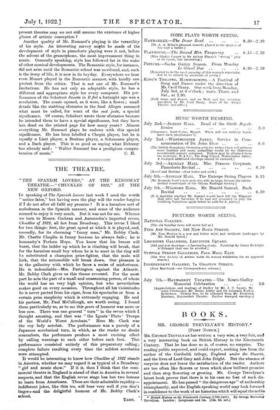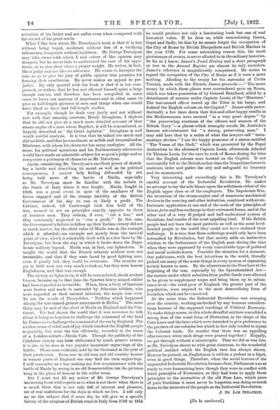BOOKS.
MR. GEORGE TREVELYAN'S HISTORY.* [FIRST Nonce.]
MR. GEORGE TREVELYAN has written a very wise, a very fair, and a very interesting book on British History in the Nineteenth Century. That he has done so is, of course, no surprise. The reading public expected, and could expect, nothing less from the author of the Garibaldi trilogy, England under the Stuarts, and the lives of Lord Grey and John Bright. But the absence of surprise does not lower the satisfaction of the reader. Authors are too often like flowers or trees which show brilliant promise and then stop flowering or growing. Mr. George Trevelyan's latest book proves that there is in his case no fear of such dis- appointment. He has passed " the dangerous age" of authorship triumphantly, and the English-speaking world may look forward in confidence to the work of an historian which will equal the noble • British History in the Nineteenth Century (1782-1901). By George Kameda, Trevelyan. London : Longman and Co. [12a. ed. net.]
activities of his father and not suffer even when compared with the record of his great-uncle.
What I like best about Mr. Trevelyan's book is that it is fair without being vapid, moderate without loss of a vivifying vehemence, temperate without tepidness. Mr. George Trevelyan may take views with which I and others of like opinion may disagree, but he never fails to understand the case of his oppo- nents, or to give their views a proper weight. He writes, in fact, like a judge and not like an advocate. He wants to interpret the case so as to give the jury of public opinion true premises for forming their conclusions. He never makes an appeal to pre- . judice. My only quarrel with his book is that it is too 'com- pressed, or rather, that he has not allowed himself quite a large enough canvas, and therefore has been compelled in some eases to leave out matters of importance and in other cases to give us half-length pictures of men and things when one would have liked to have had full-length studies.
For example, though he deals very justly and not without zest with that amazing creature, Henry Brougham, I deplore that he did not give ua a much more detailed account of that steam-engine of a man whom Bagehot, it will be remembered, so happily described as " the Great Agitator." Brougham is well worth careful analysis. It is true that he talked too much and did too little, and that he was almost as selfish and demoralized as Mirabeau, with whom his character has many analogies. All the same, his political agitations and his Parliamentary advocacies would have made an admirable subject for so good a judge and so competent a portrayer of character as Mr. Trevelyan.
Again, considering Mr. Trevelyan's excellent power of sketch- ing a battle and describing its moral as well as its political consequences, I cannot help feeling defrauded by not being told more of the battle of Maids, especially as Mr. Trevelyan must be familiar with the terrain in the South of Italy where it was fought. Maids, fought in 1806, was a great event in spite of the smallness of the forces engaged and of the strange inability of the British Government of the day to run so likely a profit. The Cabinet, indeed, till Castlereagh took firm hold of the war, seemed to act on principles exactly opposite to those of business men. They seldom, if ever, " cut a loss," and they constantly neglected to " run a profit." In this case, the Government's failure to follow up their Italian victory did not so much matter, for the chief value of Maids was in the example which it afforded—an example not merely from the tactical point of view, which is admirably dealt with in a few lines by Mr. Trevelyan, but from the way in which it broke down the Napo- leonic military legend. Maids was, in fact, our Sphacteria. It taught the world that the French infantry soldiers were not irresistible, and that if they were faced by good fighting men, even if poorly led, they could be overcome. The recruits we got in 1806 were not very much to look at, but they were honest Englishmen, and that was enough.
The victory at Sphacteria, it will be remembered, shook ancient Greece, because up to that time the Spartan heavy-armed soldier had been regarded as invincible. When, then, a body of Spartans were beaten and made to surrender by Athenian soldiers, who were regarded as their natural inferiors, the magic was over. To use the words of Thucydides, " Nothing which happened during the war caused greater amazement in Hellas." The same thing may be said of the effect of Maida on England and the Con- tinent. We had shown the world that it was nonsense to talk about it being as hopeless to challenge the command of the land by France as to challenge the command of the sea by England. The sudden sense of relief and of joy which touched the English people is quaintly, but none the less efficiently, recorded in the name of a London suburb—Maida Vale. Though the publicity of the Calabrian victory was later obliterated by much greater events, it is also to be seen in two popular mezzotint engravings of the battle. These were evidently sold by the thousand in the year of their production. Even now in old inns and old country houses in remote parts of England one may find the twin engravings.
well remember as a boy making my first acquaintance with the battle of Maids by seeing in an old Somersetehire inn the pictures bung in the place of honour in the coffee room.
But I must not fill my notice of Mr. George Trevelyan's fascinating book with regrets as to what is not there when there is io much there that is not only full of interest and pleasure, )ut of real usefulness for the days in which we live. I will only lay on this subject that if some day he will give us a specific history of the progress of British arms in Italy from 1792 to 1815
he would produce not only a fascinating book but one of real historical value. If he does so, while remembering Genoa, Capri and Sicily, let him by no means forget the occupation of the City of Rome by British Bluejackets and British Marines in the year 1799. For some astonishing reason this, the most picturesque of events, is never alluded to in the ordinary histories. So far as I know, James's Naval History and a short paragraph or two in the Annual Register are almost its only recorders. James's reference is magnificently compressed. He seems to regard the occupation of the City of Rome as if it were a mere nothing. Alluding to the treaty for the surrender of Civita Vecchia, made with the French, James proceeds :—" The same treaty by which these places were surrendered gave up Rome, which was taken possession of by General Bouchard, aided by a detachment of seamen under Captain Louis, of the' Minotaur.' The last-named officer rowed up the Tiber in his barge, and hoisted the English colours on the Capitol." James adds paren- thetically a few lines down that this and other happy results in the Mediterranean were secured " in a very great degree " by " the persevering exertions of the officers and seamen of the British Navy "—a phrase which strangely recalls Mr. Jorrocks's famous advertisement for " a strong, persevering man." may add here that by a series of what the lawyers call " testa- mentary devises " I am the happy possessor of a statue entitled " The Venus of the Shell," which was presented by the Papal Authorities to the aforesaid Captain Louis, afterwards Admiral Sir Thomas Louis, for the care he took of some during the time that the English colours were hoisted on the Capitol. It not unnaturally fell to the British rather than the Neapolitan forces to maintain order and police the city and safeguard its treasury and its monuments.
Very interesting and exceedingly fair is Mr. Trevelyan's careful account of the Industrial Revolution. He makes no attempt to lay the sole blame upon the selfishness either of the English upper class or of the employers. The Napoleonic War, the invention of the steam-engine and of numerous mechanical devices in the weaving and other industries, combined with anun- fortunate application at one end of the scale of the principles of laissez-faire and free exchange in their extremest forms, and at the other end of a very ill-judged and half-understood system of Socialism, had results of the most appalling kind. If the British people had not been the most patriotic as well as the most level- headed people in the world they could not have endured their sufferings. It is true that these sufferings would only have been intensified by Revolution, but that merely adds an instinctive wisdom to the forbearance of the English poor during the time when they were oppressed by every conceivable type of political and social maladroitness. Consider the situation for a moment. Our politicians, with the best intentions in the world, literally picked out many of the worst things in every system of organizing society known to man. By the alterations in the Peor Law at the beginning of the war, especially by the Speenhamland Act— the statute under which subsidies from public funds were allowed to be given to supplement wages and bring them up to subsis- tence level—the rural poor of England, the greater part of the population, were exposed to the most demoralizing form of Socialism which can be conceived.
At the same time, the Industrial Revolution was sweeping over the country, working unchecked by any humane considera- tions because of the supposed teachings of Political Economy. To make things worse, to this whole dreadful mixture was added a strong dose of the worst form of Protection in the shape of the Corn Laws and the laws which were intended to give preference to the produce of our colonies but which in fact only tended to injure the Colonial trade. No wonder that there was an appalling effervescence when such drugs were poured together ! Happily, we got through without a catastrophe. That we did so was due, as Mr. Trevelyan shows us with great clearness, to the wonderful political instinct which the English race has always shown. Heaven be praised, an Englishman is seldom a pedant or a bigot, even in good things. Therefore, when the social horrors of the unguarded Industrial Revolution became clear, Parliament was as ready to vote humanizing laws, though they were in conflict with strict principles of Economics, as they had been to apply those principles to the enormities of the old Poor Law, which piece of pure Socialism it must never be forgotten was doing as much harm to the interests of the people as the Industrial Revolution.
J. Si". Los STRACHEY.
(To be continued.)











































 Previous page
Previous page